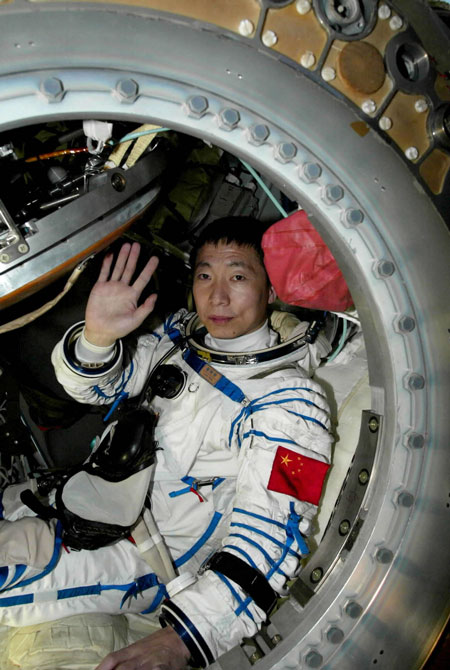China Just Weeks From Second Manned Spaceflight

China isparing down the list of astronauts to fly aboard its second manned spaceflight,a two-person mission set to launch within weeks, state news reports saidWednesday.
Severaltwo-astronaut teams have been selected from a candidate field of 14 formerfighter pilots, though the final decision will depend on how they perform inupcoming tests, Zhang Qingwei, president of the China Aerospace Science andTechnology Corp., told the Shanghai Morning Post. The state run XinhuaNews Agency later reported the announcement.
"The launchof Shenzhou 6 spacecraft could be in September or October," Zhang told theShanghai Morning Post, adding that a flag for the 2010 World Expo in Shanghaiwill be included on the flight.
Accordingto earlier reports,a Long March2F rocket is slated to launch two Chinese astronauts, also known as"taikonauts," on a five-day to six-day mission to conduct experiments aboardShenzhou 6. One such experiment will apparently study the effects ofmicrogravity and space radiation on pig sperm, Xinhua reported.
The two-personflight will follow the Oct. 15, 2003 launchof Shenzhou 5, which carried astronaut Yang Liwei into orbit and made China oneof only three countries to independently launch a human into space. Russia andthe U.S. are the others.
Tuckedinside his Shenzhou 5 capsule, which is based on Russia's Soyuz spacecraft butextensively modernized, Yang orbited Earth 14 times during his 21 1/2-hourspaceflight before returning safely.
Chinesespace officials have said in the past that the Shenzhou flights will testtechnologies that will lead toward docking and, ultimately, space stationhardware. The Chinese National Aerospace Administration hopes to land a probeon the moon by 2010, according to past reports.
Get the Space.com Newsletter
Breaking space news, the latest updates on rocket launches, skywatching events and more!
Preparingfor the future
As Chinacounts down to its second manned Shenzhou flight, plans are already underwayfor an extended human spaceflight program.
InShanghai, construction began Tuesday on a new $160-million space center to bedevoted to researching, testing and producing rockets, manned spacecraft anddefense satellites, the Shanghai Space Bureau told Xinhua. Five researchinstitutes will be based at the new center's 183-acre site, the report stated.
Meanwhile,China has also begun training its first group of female astronauts this year.
Accordingto Xinhua reports, 35 women between the ages of 17 and 20-years-old wererecruited for the country's female astronaut program.
At least fouryears of university courses, as well as flight and science training, will berequired before any of the candidates fly, though Chinese space officials hopeto launch their first female astronauts by 2010.
"They willembark on a space mission no later than 2010, working as flight commanders oron-board engineers," Hu Shixiang, deputy chief of commander of China's mannedspace program, told China Daily during the announcement.
- Making History: China Launches its First Piloted Spaceflight
Join our Space Forums to keep talking space on the latest missions, night sky and more! And if you have a news tip, correction or comment, let us know at: community@space.com.

Tariq is the Editor-in-Chief of Space.com and joined the team in 2001, first as an intern and staff writer, and later as an editor. He covers human spaceflight, exploration and space science, as well as skywatching and entertainment. He became Space.com's Managing Editor in 2009 and Editor-in-Chief in 2019. Before joining Space.com, Tariq was a staff reporter for The Los Angeles Times covering education and city beats in La Habra, Fullerton and Huntington Beach. In October 2022, Tariq received the Harry Kolcum Award for excellence in space reporting from the National Space Club Florida Committee. He is also an Eagle Scout (yes, he has the Space Exploration merit badge) and went to Space Camp four times as a kid and a fifth time as an adult. He has journalism degrees from the University of Southern California and New York University. You can find Tariq at Space.com and as the co-host to the This Week In Space podcast with space historian Rod Pyle on the TWiT network. To see his latest project, you can follow Tariq on Twitter @tariqjmalik.









